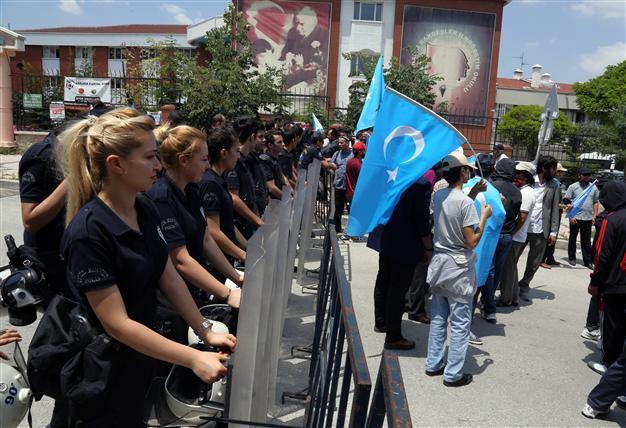Thailand says rejected China request to deport all Uighur Muslims
BANGKOK - Reuters

Riot police stand as a group of Uighur protesters demonstrate outside the Thai embassy in Ankara, Turkey, Thursday, June 9. AP Photo
Thailand said on July 10 that it had rejected a request from Beijing to deport all Uighur Muslims held in detention camps back to China, two days after the deportation of nearly 100 Uighurs sparked international criticism.
Beijing's request was denied based on the grounds that the Uighurs' nationalities had to be "verified" by Thai authorities first, Colonel Weerachon Sukhondhapatipak, deputy Thai government spokesman, told reporters.
"We did this according to international agreement and international law and keeping in mind human rights," said Weerachon.
"This decision was difficult to make. It is not like all of a sudden China asks for Uighurs and we just give them back. China asked for all Uighur Muslims in Thailand to be sent back but we said we could not do it," he said.
More than 170 Uighurs were identified as Turkish citizens and sent to Turkey from Thailand over the past month, said Weerachon, while nearly 100 were sent back to China. Fifty others still need to have their citizenship verified.
Thailand's decision to deport nearly 100 Uighurs from several immigration detention centres in Bangkok late on Wednesday was condemned by the United States and the United Nations High Commissioner for Refugees (UNHCR) who strongly urged China to ensure proper treatment of the Uighurs.
Hundreds, possibly thousands, of Uighurs have fled unrest in China's western Xinjiang region where hundreds of people have been killed, prompting a crackdown by Chinese authorities. They have travelled clandestinely through Southeast Asia to Turkey.
China's treatment of its Turkic language-speaking Uighur minority is a sensitive issue in Turkey and has strained bilateral ties ahead of a planned visit to Beijing this month by President Tayyip Erdoğan. Erdoğan plans to raise the plight of the Uighurs during his trip.
Turkish protests
The deportation of the Uighurs has sparked protests in Turkey. Police used tear gas on July 9 to disperse about 100 protesters at the Chinese Embassy in the capital Ankara after they knocked down a barricade and protesters attacked Thailand's honorary consulate in Istanbul late on July 8, smashing windows and breaking in.
Thai Prime Minister Prayuth Chan-ocha has raised the possibility of shutting the Thai embassy in Ankara, but on July 10 said he wanted to maintain good relations with both Turkey and China.
"Thailand and Turkey are not rivals and we do not want to destroy trade and commerce with Turkey," Prayuth told reporters in Bangkok. "At the same time, we do not want to destroy the relationship between China and Thailand."
Turkey has vowed to keep its doors open to Uighur migrants fleeing persecution in China. Some Turks see themselves as sharing a common cultural and religious heritage with their Uighur "brothers" and Turkey is home to a large Uighur diaspora.
Human Rights Watch called on Thailand to halt the deportation of Uighur Muslim migrants to China in a statement on July 10, fearing they could face ill-treatment.
The New-York based rights group said the risks to Uighurs forcibly returned to China were "grim and well established."
"Thailand should make it clear it won't further violate international law by immediately announcing a moratorium on additional deportations of Turkic people to China," said Sophie Richardson, China director for Human Rights Watch.
On July 10, the Global Times, an influential tabloid published by China's ruling Communist Party's official newspaper, said China's Ministry of Public Security confirmed that police "successfully repatriated" more than 100 people from Thailand.
The newspaper said the people were mostly from China's Xinjiang region, the heartland of the Muslim Uighur people who call the region home, and were "illegal immigrants" or members of gangs involved in people smuggling.
"Many among them planned to reach Turkey through Southeast Asian countries and then head to Syria and Iraq to participate in terrorist groups," the newspaper said.
The Ministry of Public Security did not respond to a request for comment.
Beijing denies restricting the Uighurs' religious freedoms and blames Islamist militants for a rise in violent attacks in Xinjiang in the past three years in which hundreds have died.
China is home to about 20 million Muslims spread across its vast territory, only a portion of whom are Uighurs.
